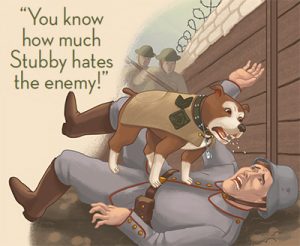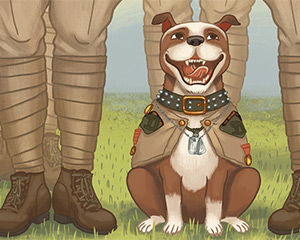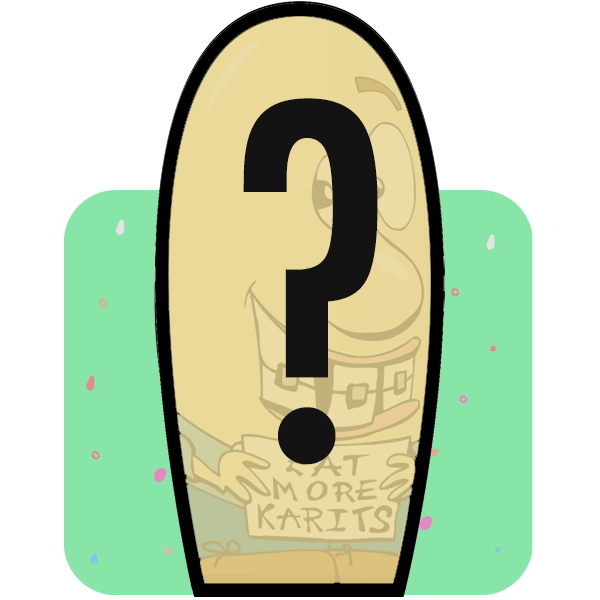by Judy Shull
Click here to read this story as it appeared in the magazine with all the graphics.
Look to the right,” Robert Conroy whispered without moving his lips. The private standing next to him rolled his eyes in the indicated
direction. “It’s a dog,” Robert added.
As soon as the men were dismissed, the two soldiers strolled over to investigate the animal. Several other soldiers had noticed the dog and joined Robert and his
friend.
“ What kind of dog is that?” Robert asked as he stood staring down at a brown puppy with white markings.
“I don’t know,” one man responded. Then he asked, “ What do you think he’s doing here?”
“Maybe he wandered in looking for food,” another man suggested.
Several of the soldiers training on that hot summer day in Connecticut’s Yale Field tried to make friends with the stray dog.
They left food and water for it, hoping to encourage the animal to return. Then, as they ran laps, did push-ups, and learned to carry, load, and fire weapons, they also watched for the dog.
Robert especially hoped the dog would return. It was a nice distraction from the preparations for going to fight in the Great War in Europe.
The dog did return, and Robert became his special friend.
“I think we should call him Stubby,” Robert suggested one day, “because of his short little tail.”
“It’s as good a name as any,” the private next to Robert agreed.
Stubby quickly learned his name and watched the men practicing every day. The men had to learn what the bugle calls meant. One sound signaled for the men to rush forward; another called them to fall back from the enemy. There was even a bugle call to stand in formation.
One day Robert told some other soldiers, “Watch Stubby when we are practicing. I think he knows what the bugle calls mean.”
By the end of the day Robert’s friends agreed. “Stubby does do what the bugle signals.”
“Better than some of the men on the field,” joked one of the soldiers gathered around the dog.
“Robert,” called one of his friends from across the room, interrupting these troubling thoughts. “ What are you going to do with Stubby when we leave?”
Now, this was something better to think about. Robert smiled, glad for the distraction.
Robert’s unit left Connecticut by train, and Stubby went with them. “Dogs are forbidden to be with American soldiers,” Robert’s friends reminded him as they took turns petting Stubby.
“I know, but I can’t leave him behind,” Robert explained.
“He’s become one of us.”
“He sure has,” Robert’s best friend agreed, “but what are you going to do when we get to the Newport News naval station in Virginia?”
“I have no idea,” Robert admitted. Getting Stubby aboard ship was going to be a much bigger problem.
At the shipyard thousands of soldiers were waiting to board the largest freighter on the Atlantic Ocean, the S.S. Minnesota. The young soldier watched as different infantry units assembled, and then, single file, the soldiers walked up the gangways. Suddenly Robert had an idea!
“So how did you get the dog on board ship?” one of Robert’s friends asked as the ship began the trip across the Atlantic Ocean.
“And where is the little fella now?” another soldier asked.
Robert grinned. “You know the greatcoats we were issued?” He pointed to the heavy gray coat lying across his hammock. The thing reached to his knees, with a cape across the shoulders draping to his elbows, and waterproof pockets for keeping food and paper dry. The coat was intended to be used even as a blanket if needed. “It’s too hot to wear that thing now,” Robert began, “but it proved to be a wonderful place for hiding a little dog when boarding a ship.”
The men laughed, and agreed that Robert’s plan had worked well.
“Where is Stubby now?” repeated one of the soldiers.
Robert looked around, making sure that only his friends could hear his answer. “He’s hidden down in a coal bin, deep in the ship. When we get far enough out to sea, I’ll let him out.”
A few days later one of the sailors on the S.S. Minnesota gave a surprised shout, “What is that?”
“It’s a dog!” came the quick identification.
“I know it’s a dog. But what is it doing on our ship?”
Stubby soon proved to be a friend to the sailors as well as the soldiers on the S.S. Minnesota. The happy dog was left to wander around in the sunshine, making friends wherever he went.
“Robert,” called one of the machinists, sailors who work with metal. “I made these for Stubby. The soldier dog needs his own set of dog tags,” he explained, handing the etched metal strips to Robert.
Robert put the tags around Stubby’s thick neck and wondered what would happen to his dog when they reached France.
A few days later Robert received the answer.
“What’s that dog doing here!” yelled the commander after Robert and Stubby arrived at their new training field on the west coast of France.
Robert had been dreading this day all the way across the Atlantic Ocean, and he still had no good answer, but Stubby did. The soldier dog sat down and raised his right paw to his right eye as he had watched the soldiers do so many times, and gave his best doggie salute.
“What?” The commander shouted, caught completely by surprise. Then he began laughing. Finally, regaining his breath, the commander looked at the saluting Stubby and said, “Any dog who can do that is welcome in my army.”
Robert breathed a sigh of relief; Stubby could stay with him.
During the Great War, now known as World War I, a weapon commonly used was poisonous gas. Each soldier was given a gas mask to help protect them, and Stubby was given one too, but because he was a dog and the masks were designed for men, Stubby’s mask did not fit very well.
One day Robert’s unit was attacked by the gas, and Stubby breathed in some of it. “Oh, no!” cried Robert when he saw Stubby getting very sick.
Robert rushed over to the medic, who took one look at the dog and ordered, “Get Stubby to an ambulance and take him to the field hospital.”
For several days Robert worried about his friend. It was days later before he heard, “Robert, here’s Stubby!” The two friends were reunited with great joy. After that, Stubby was especially sensitive to the smell of the poisonous gas, and that turned out to be a very good thing!
“Wake up! Wake up!” Stubby’s barks echoed through the rooms where the soldiers were sleeping. During the night attack, Stubby had smelled the poisonous gas while it was a long way away. The dog was desperate to warn the soldiers of the approaching danger. “Wake up! Wake up!” he howled, running as fast as his short legs would carry him. When Stubby discovered a soldier too deeply asleep to hear his warning, he gave the man little bites on his legs to get his attention.”
After the attack was over, different soldiers said, “Stubby, you’re a real hero. You saved my life tonight.”
“We should recommend you for a promotion!” another soldier suggested.
Robert stroked Stubby’s head and looked into the loving eyes, “Stubby, you really are a hero,” he said. “You saved every man’s life here tonight.” Stubby looked back at his friend with understanding.
A few days later, as the unit stood in formation, the commander called Stubby to the front. Looking down at the dog, he announced, “Stubby, because of your bravery and warning your fellow soldiers, you have received the rank of private first class.”
The men cheered, and Stubby decided this was a signal to give his best dog salute.

As the days of the Great War continued, Stubby showed he had another skill: he had learned to identify the different uniforms of friends and enemies. Stubby’s friends wore khaki or tan camouflage cotton uniforms. The enemy wore gray wool uniforms. Stubby could tell the difference. One day this skill proved to be very important. Stubby saw someone hiding in the bushes near his trench, and the man was wearing an enemy uniform! Stubby began to bark a warning to his friends!
Stubby grew suspicious of this stranger, and his growling concerned the hiding soldier.
“Nice doggie, nice doggie,” the man cooed, using his friendliest voice. But Stubby was not fooled. He understood English, and these words were not English. This man was not a friend!
Stubby was furious. He ran after the hiding enemy, and the soldier took off running, with Stubby in hot pursuit.
“Look, Stubby is chasing a spy!” shouted one of Robert’s friends.
“We’d better get him!” Robert called, scrambling out of the trench.
“Who?” another soldier asked. “Stubby or the spy?”
Keeping low to the ground so they would not be easy targets for the enemy, Robert replied, “We’d better get both. You know how much Stubby hates the enemy.”
The spy had been hiding in the bushes and attempting to draw a map of the layout of the trenches when Stubby had spotted him. Stubby had taken off at full speed as the spy tried to escape. The dog bit at the the spy’s legs and caused him to trip and fall.
As the American soldiers got closer, they could see that Stubby had captured the spy.
“Get off! Get off!” the captured soldier screamed at Stubby, as the dog stood on the spy’s chest and continued barking his loudest and threatening to bite.
“Well done, Stubby,” Robert praised his friend as he pulled him off of the spy. “I think you have captured your first enemy.”
But Stubby did not hear Robert; he was too busy growling and barking.
“Robert, you had better hold on to Stubby,” one soldier said as he grabbed the captured enemy’s arms. “ We don’t want Stubby ripping the man’s pants off before we can get him to prison.” Everyone laughed at that remark as they escorted their prisoner back to the trench. Months before, the American soldiers had realized that every time they brought prisoners past the dog, someone had to hold Stubby to keep him from tearing off the prisoners’ pants!
That evening Stubby was praised for his heroic actions of the day. “Hey, I think we need to put you in for another promotion,” one soldier joked, but another soldier smiled at the idea.
Before too many days passed, the unit commander called for Stubby. “Stubby,” the commander began as the dog sat politely, “I have an important piece of paper for you.” He showed Stubby the paper. Then the commander read, “This paper gives you the military rank of sergeant for your heroism on the battlefield.” The commander glanced at Robert before continuing to read, “ You are the first dog given the rank of sergeant in the United States Armed Forces.”
“Well, Stubby,” Robert said as they walked back to their spot in the trench, “you now have a higher rank in this army than I do.”
The German Army had dug rows and rows of trenches. And the Americans, British, and French were in their own opposite rows of trenches. These trenches could be anywhere from 50 to 250 feet apart. The land in between the enemies was called no-man’s-land. Frequently this area was covered in land mines and had barbed wire stretched across it. If an attacking enemy soldier was spotted trying to cross this area, the other side would shoot at him.
“Help! Help!” The scream pierced the night air.
“Someone’s either lost or hurt out there,” Robert whispered one night to the soldier standing next to him. “ What should we do?”
Both men had the same thought in mind: if they went out into no-man’s-land, they could easily become lost in the dark, step on a mine, or become tangled in the barbed wire. But before they could make a rescue plan, they heard Stubby scrambling up the side of the trench and disappearing into the night.
A few minutes later they heard Stubby barking. “He’s found him,” Robert exclaimed. “Get the medic, and let’s find this guy.”
Following the sound of Stubby’s barks, the medic and Robert cautiously made their way through a stretch of no-man’s-land. “There he is.” Robert directed the medic’s attention. Robert was used to finding Stubby in the dark. The dog was able to locate a safe path to the injured soldier. Stubby had been responsible for rescuing many wounded men.
“Good job.” Robert patted Stubby on the head. “ You’ve saved another person.”
Stubby wagged his short tail, enjoying Robert’s attention as the medic tended to the soldier’s wounds before they helped get the man back to the trench.
On another night Robert heard Stubby scramble out of the trench. “ Where’s he going now?” a young soldier asked Robert. “I didn’t hear anyone calling for help.”
Robert shook his head. “It’s hard to hear over all the weapons firing.” “So where’d he go?” the soldier repeated.
“ Wait and see” was Robert’s only reply.
The men waited, and before too long Stubby jumped back into the trench, followed by a soldier.
“ Who are you, and what happened?” Robert asked.
“I was lost in no-man’s-land. In the dark I couldn’t tell which way to go to get back to the American trenches. I was afraid to move, because I didn’t know where the land mines were.
Then this dog shows up and leads me back here.”
Robert patted Stubby and whispered, “Good job.”
This small pomegranate-sized weapon was filled with little metal pieces that flew out when the grenade exploded.
One day, as the enemy was launching grenades, one landedin Robert and Stubby’s trench. It exploded, and Stubby was hit with metal pieces, piercing his chest and left front leg.
“Help!” screamed Robert as he held his friend close, trying to stop the bleeding. Quickly Robert found the medic. “Stubby’s been wounded!”
Once again Stubby was rushed to the army field hospital, and Robert was left wondering if he would ever see his friend again. “This is a dog!” the doctor exclaimed after one glance at his next patient.
“ Yes sir,” the corpsman agreed, “but he is one of the United States soldiers, and he was wounded at the front lines.”
“A dog?” The doctor looked into the pain-filled eyes of the animal in front of him. “I am not a veterinarian, but I’ll see what I can do to help this poor creature.”
The doctor was able to successfully get the little pieces of metal out of Stubby’s body. “Now what do we do with him?” the doctor asked his assistant as he finished stitching up Stubby’s wounds.
Studying the dog, the assistant made a logical suggestion: “We send him to the rehabilitation hospital like any of our other wounded soldiers. I understand this dog has the military rank of sergeant.”
Shaking his head in disbelief, the doctor gave the order: “Send Sergeant Stubby to the rehabilitation hospital until he is fully recovered.”
As Stubby began to feel better, he was allowed to roam around the hospital. “Look, here he comes,” one soldier, lying in bed, announced as he saw Stubby limping down the hall.
“Here, boy; here, boy,” called a wounded man who could not get out of his wheelchair. Stubby greeted everyone with joy, wagging his short stubby tail to let them know that he was pleased to see them.
“I thought having a dog at the hospital was a silly idea,” one nurse told another.
A doctor, overhearing their conversation, added, “I know, but look how happy he makes the soldiers when he visits them.”
“He makes me happy too,” added the nurse. They watched the dog as he made his way from one bed to another, bringing smiles at each stop.
After Stubby left their room, one soldier said, “I will really miss that dog when he is fully recovered. I can see him getting better every day.”
Another soldier added, “Stubby gives me hope that I am going to recover
too.”
Many days later Robert heard a loud cheer coming from the far end of his trench. He hurried to learn what all the excitement was about. Before he reached the crowd, a brown blur came dashing toward him. “Stubby! You’re all right?” was all Robert could cry before he held his wriggling friend in his arms and received many doggie kisses.
The Great War finally ended on November 11, 1918. On Christmas Day an important man strode across the empty battlefield. “I want to meet Sergeant Stubby,” President Woodrow Wilson announced.
Stubby used all his skills to help people. He brought them joy and happiness and personally did his best to keep others safe. If a little dog can accomplish so much, what can you do to improve other people’s lives?



2 thoughts on “The Adventures of Stubby the Brave”
cool
Wow!! That is such a good story!! Beautiful!! I love it a lot!